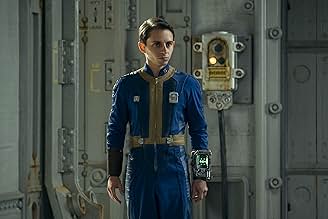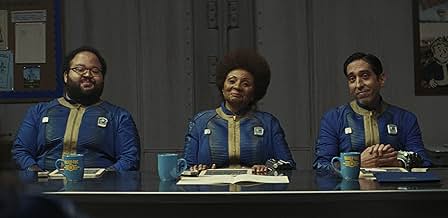A humble recruit from a post-apocalyptic organization is tasked with scouting the wasteland in search of pre-war technology to preserve it, facing challenges and critiques along the way.A humble recruit from a post-apocalyptic organization is tasked with scouting the wasteland in search of pre-war technology to preserve it, facing challenges and critiques along the way.A humble recruit from a post-apocalyptic organization is tasked with scouting the wasteland in search of pre-war technology to preserve it, facing challenges and critiques along the way.
Storyline
Did you know
- TriviaOne of the men that dig up The Ghoul uses a Junk Jet, a weapon from the Fallout games that is essentially a steam-powered potato gun, literally shooting whatever junk items you're carrying.
- GoofsJaney is watching the city as the bomb hits, but the flash of light from the explosion would not cause instant blindness if the person is far enough away. An inverse square law applies, where the observed light intensity is inversely proportional to the square of the distance from the light source. Furthermore, it was clearly a ground burst, which means a lot of the initial flash was shielded by the downtown buildings.
- SoundtracksSome Enchanted Evening
(uncredited)
Written by Richard Rodgers, Oscar Hammerstein II
Performed by The Castells
Featured review
The series "Fallout" begins with Episode 1, "The End," establishing the post-apocalyptic world in which the characters must navigate the shattered remnants of society. The episode kicks off with a strong visual narrative, immersing the audience into the bleak landscape after a nuclear disaster. The tone is set from the opening scene, where we see crumbling buildings, desolate wastelands, and remnants of pre-war civilization. This episode centers on introducing key characters and the dire situation they are in, showing them struggling to survive in a world where the rules have dramatically changed.
The direction by the episode's helmer is sharp and focused, ensuring the audience feels the weight of the world's collapse without losing the human element of the story. The camera work beautifully captures the vastness of the devastated world, juxtaposing it against the intimacy of the characters' personal struggles. The use of close-up shots emphasizes their fear, desperation, and hope. However, the pacing at times feels uneven, with some moments dragging while others feel rushed. The first half of the episode takes time to establish the setting and introduce the rules of this dystopian future, which could have been streamlined for greater impact.
Performance-wise, the ensemble cast delivers solid portrayals of survivors clinging to hope amid overwhelming adversity. The lead actor, in particular, stands out with a nuanced performance that conveys a mix of resilience and vulnerability. Supporting characters, while compelling, lack depth in this initial episode, but the foundations for potential development are clearly laid out. This may be a deliberate choice, focusing first on setting the tone and world-building before delving deeper into individual arcs. One standout scene showcases a tense confrontation between two survivors, highlighting the moral gray areas that will likely become central to the narrative.
The script effectively introduces core themes of survival, morality, and human nature in the face of catastrophic loss. Dialogue feels natural, though at times it leans into clichés typical of the genre. That said, the world-building is the true highlight here, with careful attention to details like the fallout shelters, scavenging for supplies, and the oppressive atmosphere of fear. It's evident that the showrunners have taken great care to remain faithful to the source material, yet they inject their own flair, making the story accessible even to those unfamiliar with the "Fallout" video game franchise.
In conclusion, "The End" sets up a promising premise for the series, though it is not without its flaws. The episode struggles with pacing in parts and some characters feel underdeveloped at this stage. However, the world is captivating, the performances are strong, and the visual and thematic elements are engaging enough to keep viewers invested. If the show can balance its pacing and flesh out its supporting cast, it has the potential to become a standout series in the post-apocalyptic genre.
The direction by the episode's helmer is sharp and focused, ensuring the audience feels the weight of the world's collapse without losing the human element of the story. The camera work beautifully captures the vastness of the devastated world, juxtaposing it against the intimacy of the characters' personal struggles. The use of close-up shots emphasizes their fear, desperation, and hope. However, the pacing at times feels uneven, with some moments dragging while others feel rushed. The first half of the episode takes time to establish the setting and introduce the rules of this dystopian future, which could have been streamlined for greater impact.
Performance-wise, the ensemble cast delivers solid portrayals of survivors clinging to hope amid overwhelming adversity. The lead actor, in particular, stands out with a nuanced performance that conveys a mix of resilience and vulnerability. Supporting characters, while compelling, lack depth in this initial episode, but the foundations for potential development are clearly laid out. This may be a deliberate choice, focusing first on setting the tone and world-building before delving deeper into individual arcs. One standout scene showcases a tense confrontation between two survivors, highlighting the moral gray areas that will likely become central to the narrative.
The script effectively introduces core themes of survival, morality, and human nature in the face of catastrophic loss. Dialogue feels natural, though at times it leans into clichés typical of the genre. That said, the world-building is the true highlight here, with careful attention to details like the fallout shelters, scavenging for supplies, and the oppressive atmosphere of fear. It's evident that the showrunners have taken great care to remain faithful to the source material, yet they inject their own flair, making the story accessible even to those unfamiliar with the "Fallout" video game franchise.
In conclusion, "The End" sets up a promising premise for the series, though it is not without its flaws. The episode struggles with pacing in parts and some characters feel underdeveloped at this stage. However, the world is captivating, the performances are strong, and the visual and thematic elements are engaging enough to keep viewers invested. If the show can balance its pacing and flesh out its supporting cast, it has the potential to become a standout series in the post-apocalyptic genre.
- fernandoschiavi
- Oct 19, 2024
- Permalink
Details
- Runtime1 hour 14 minutes
Contribute to this page
Suggest an edit or add missing content

























